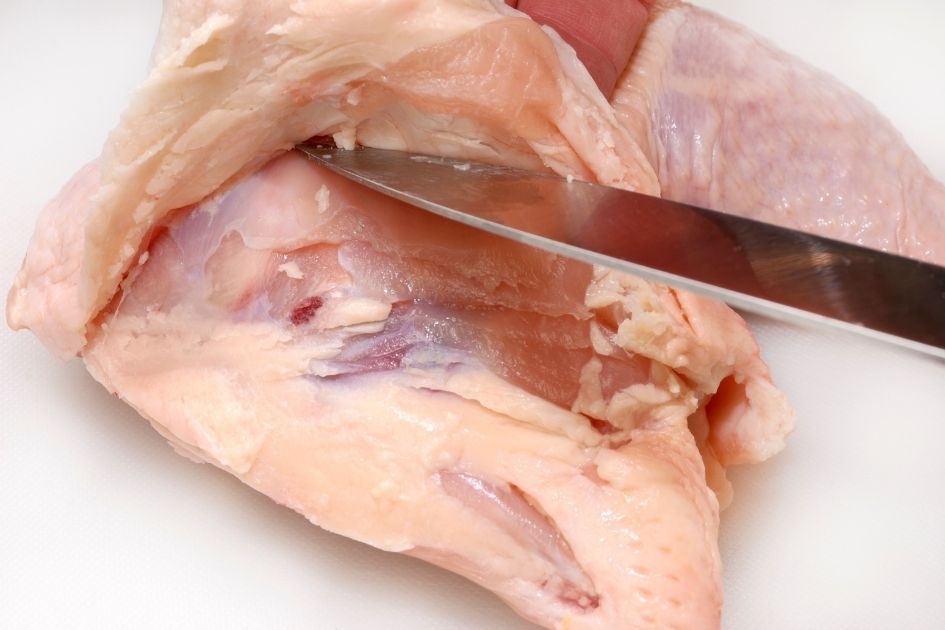Perhaps your dog goes on bent knees on the few or several occasions you’ve had chicken in his presence and would likely enjoy a chicken treat with you.
You’ve reasonably thought of handing him a piece to see the expression of gratitude in his eyes.
For all you know, being generous won’t hurt.
However, it would help if you were cautious regarding your pet’s diet since what he eats determines his survival and well-being.
Can dogs eat chicken skin?
Skinless chicken is lean meat. Therefore, if a cooked lean chicken is fine for most dogs, could the chicken be bad for dogs to eat?
Hypothetically, you’ve thought about these questions, consulting the internet for a reliable answer.
This article provides information about why your dog wouldn’t mind having chicken skin, the nutritional details of chicken skin, why chicken skin isn’t a good treat, and other facts that can serve as a reference regarding your pet’s diet.
Chicken Skin: An Overview
There are notable differences between a plate of skinless chicken and chicken with skin included regarding taste and nutritional value.
Chicken can be regarded as lean meat without its skin, but its fat content significantly increases with the skin.
The above hypothesis brings us to the nutritional value of chicken skin for referral comparisons.
Here is the nutritional value of 100 grams of chicken skin:
| Nutritional Info | Amount |
|---|---|
| Calories | 349 |
| Calories from Fat | 291 |
| Total Fat | 32.4 grams |
| Trans Fat | 0.3 grams |
| Saturated Fat | 9.1 grams |
| Sodium | 63 milligrams |
| Cholesterol | 109 milligrams |
| Potassium | 103 milligrams |
| Sugars | 0 grams |
| Total Carbohydrate | 0 grams |
| Protein | 13.3 grams |
| Vitamin A | 5% |
| Vitamin C | 0% |
| Vitamin B6 | 4% |
| Vitamin B12 | 4% |
| Magnesium | 3% |
| Phosphorus | 10% |
As analyzed by the nutritional value above, we can conclude that the primary nutritional content of chicken skin is fat.
Furthermore, it offers minor quantities of other nutritional contents compared to fat, including vitamins and protein.
Breeders and veterinarians suggest that dogs should consume no more than twenty-five calories for each pound per day.
In comparison, the skin on one chicken breast contains about a hundred calories.
Why Does My Dog Come to Me When I Eat Chicken?
You might have noticed your dog’s dreamy looks whenever he picks up the scent of chicken.
It worsens when it sees you eating it, and you wonder why it won’t take its eyes off you.
Come to think of it: what will the savory, delicious smell that tickles your salivary gland, causing you to drool and anticipate a plate of grilled, cooked, or fried chicken do to your dog’s heightened sense of smell?
Little wonder it wouldn’t mind sharing with you. Therefore, while you consider your dog’s facial expression of hunger, desire, disappointment, or dissatisfaction, beware that its intuitive ability to pick out scents is getting the better of it.
As such, it wouldn’t mind even if you feed it something that could later cause adverse health reactions at that moment.
Can Dogs Eat Chicken Skin?
While cooked lean meat (skinless chicken included) is okay for most dogs, chicken skin is high in fat and calories, and high-fat meat is best avoided.
Consuming chicken skin can cause diarrhea and digestive upsets.
You might be lucky not to notice any immediate health reactions, especially if the skin is a little cooked or fried.
However, it’s noteworthy to know that neglecting the importance of skinning chicken before feeding your dog might result in future visits to the vet for conditions like pancreatitis and weight gain.
Your canine companions do not need extra fat in their diets as fat consumption may lead to gastrointestinal upset — a severe condition for dogs.
Can Dogs Eat Raw Chicken Skin?

According to BMC Veterinary Research, many owners have decided to feed their pets with raw meat-based diets in recent years even though the assumed health benefits are based on personal accounts rather than facts or research.
In contrast, the disadvantages of consuming raw meat-based diets are well documented and research-based, with severity ranging from mild to deadly.
Suppose you’re an owner inclined to raw meat-based diets; it would be best if you’re very careful.
Raw chicken and its skin could be contaminated with E. coli, which affects your dog’s intestinal tracts and can lead to severe health conditions in dogs if consumed regularly.
Your dog could be at risk of contracting salmonella from eating raw meat, including raw chicken skin.
Salmonella consumption can lead to painful, bloody bowel movements, weakness, and dehydration due to loss of fluids through bowel movements.
It would be best if you’re rather safe than sorry.
Therefore, completely avoid giving your dog raw chicken skin to eat, even if your dog primarily consumes a raw meat-based diet.
Can Dogs Eat Cooked Chicken Skin?
Chicken skin can cause several adverse effects on your canine’s short-term and long-term health regardless of how it’s prepared.
You might think that cooking chicken skin kills the bacteria, making it healthy for your dog’s consumption.
However, the difference between the dangers of consuming cooked and raw chicken skin and is impossible to tell apart.
While the risk of contracting bacteria is reduced, your dog might react to spices.
It might be at risk of excessive weight gain and pancreatitis, depending on how you prepare the skin.
Considering the facts stated above, you’ll be putting your dog on the horns of a dilemma by giving him raw or cooked chicken skin.
What About Friend Chicken Skin?

Chicken skin should be strictly avoided to be on the safe side. Neither boiled nor fried chicken skin is suitable for dog consumption.
Fried chicken skin presents extra fat, while boiled chicken skin might contain toxic spices or seasonings.
Do Dogs Like Chicken Skin?
Harmful or not, dogs are usually on the cards to eat chicken skin. The delicious flavor of the chicken brainwashes most dogs.
Unlike vegetables, which canines are not inclined to, the unspiced chicken itself is a nice treat for dogs.
As such, blotting out chicken skin from your dog’s diet is solely your responsibility since your dog’s carnivorous instincts might overshadow his freedom of choice.
Is Chicken Skin Bad for Dogs?
While a health reaction from fat is the leading disadvantage of dogs eating chicken skin, there are other detriments to consider.
Fatty foods take longer to digest than other foods, and the duration varies based on the type of fat.
Solid fats (solid at room temperature) are more difficult to digest than liquid fats.
Similarly, chicken skin, a solid fat, can lead to choking since it’s pretty difficult to swallow, especially if consumed in large pieces.
What about cooked chicken skin?
Regardless of the short and long-term disadvantages of chicken skin fat, you might also consider the spices used for preparation.
Cooked chicken skin might be better than raw chicken skin, but spices used to prepare cooked chicken skin like garlic and onion, which are toxic to dogs, should be avoided entirely.
Garlic is known to cause sodium poisoning in dogs. Oils, salt, pepper, and other spices can cause stomach upsets.
What if my Dog Accidentally Eats Chicken Skin?
There could be short-term and long-term effects of consuming chicken skin.
If your mischievous canine gets its hand on some chicken skin or you mistakenly give it some, closely monitor it within the next 24-48 hours.
Contact your vet if you notice any allergic reactions, including vomiting, constipation, excessive thirst, and watery stools.
You might be lucky to get away with short-term reactions, but be careful not to make chicken skin consumption a regular occurrence; else, you risk future visits to the vet on matters regarding gastrointestinal upsets and pancreatitis.
What Are Some Dog-Friendly Alternatives to Chicken skin?

Since most dogs are instinctively driven by the delicious aroma of chicken, feeding them the meat portion isn’t a bad idea.
Here are some dog-friendly, non-toxic dog treats that serve as chicken skin alternatives if you find skinning chicken stressful.
These treats come in different forms: soft and chewy, natural, and freeze-dried.
The following brands are healthy, processed dog treats available on Amazon and dog food stores around you.
- Pup-Peroni Dog Snacks Original Beef Flavor: A healthy, soft, and chewy treat might be just an excellent replacement for chicken skin.
Pup-Peroni features beef as the primary ingredient but is moist and savory.
- Nudges Natural Dog Treats: We’ve got a more suitable option if beef seems too far apart from chicken.
Nudges offer grillers made with all-natural chicken without artificial flavors and preservatives, animal by-products, soy, wheat, and corn.
- Stewart Freeze-Dried Dog Treats: Stewart provides several flavors to choose from, but the “Chicken Liver” is the closest flavor to chicken.
This raw, dried snack is suitable for dogs of all sizes and is free from artificial colors, additives, preservatives, and flavors.
Can dogs have chicken skin?
Chicken skin is loaded with fat and contains a small percentage of vitamins, dietary fiber, and sugars.
Excessive fat can lead to obesity, gastrointestinal problems, and pancreatitis in dogs.
Can puppies eat chicken skin?
Logically, chicken skin would be even more dangerous for puppies than adult dogs.
Consider what chicken skin would do to your puppy’s developing digestive organs if it can lead to gastrointestinal problems in adult dogs.
Does chicken skin contain collagen?
Collagen is the protein found in the body’s various connective tissues.
Along with gelatin and bone broth, chicken skin is a reliable source of collagen. Chicken skin contains 35% connective tissue (mostly collagen).
Related:
Best Bone Broth For Dogs (Top 10 & Why They’re Good)
Can dogs have skinless chicken?
Cooked chicken cut in small pieces is safe for most dogs. Chicken is one of the most common ingredients used in dog foods because of its high protein content.
Therefore, you can feed your dog with chicken as long as it’s cooked without spice or seasoning. Onions and garlic should be strictly avoided.
Note that dogs have no universal tolerance for chicken consumption. Some dogs might show allergic reactions if they’re fed chicken.
As such, it would be best if you carefully observe your dog after providing it with chicken on the first few occasions.
Can dogs eat KFC Chicken skin?
While KFC Chicken may be a pleasant treat for you, it would be best if you completely avoid feeding your dog KFC Chicken not to talk of its skin.
KFC Chicken is drubbed in flour before it is fried in oil used multiple times throughout the day.
Can dogs eat rotisserie chicken skin?
Rotisserie chicken is a delicious dish, but it’s not advisable giving it to your pup. Rotisserie chicken skin offers no nutritional benefits, albeit calories and fats.
Moreover, rotisserie chicken is prepared with salt, garlic, pepper, and vinegar.
Bottom Line: Is Chicken Skin Safe for Dogs?
After considering the nutritional content of chicken skin, the dangers of raw and cooked chicken skin, and the risks chicken skin presents, deciding to completely avoid feeding your pups chicken skin is the best risk-free option you can take.
If you’ve been feeding your dog chicken skin and he’s tolerant, you can do well to stop as soon as possible.
In the long run, you’ll be putting your dog between the devil and the deep blue sea when it starts suffering from gastrointestinal issues.
Thankfully, there are a few alternatives to consider in place of chicken skin for dogs.
Do well to contact your vet for further advice regarding diet and health reactions resulting from eating chicken skin.
You May Also Like:
Can Dogs Eat Corned Beef? Is It Toxic to Dogs?







